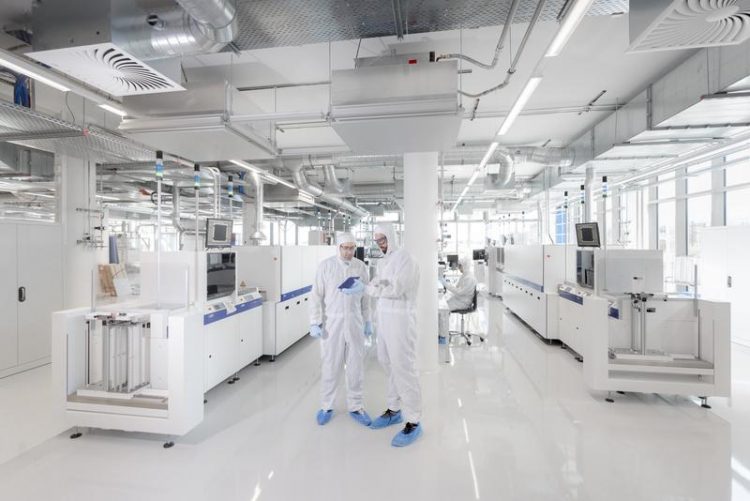Photovoltaic Technology Evaluation Center PV-TEC Reopens: Innovation Platform for the PV Industry

The back-end site of Fraunhofer ISE’s Photovoltaic Technology Evaluation Center in the Solar Info Center in Freiburg was officially opened in July 2018 following its refurbishment. Fraunhofer ISE/Dirk Mahler
In February 2017, a fire rendered the equipment at Fraunhofer ISE’s Photovoltaic Technology Evaluation Center PV-TEC in the Solar Info Center in Freiburg completely unusable. Sixteen months later, the leading PV technology platform for material manufacturers and suppliers operating in the PV industry is being reopened.
Since the fire, ongoing projects had been delayed, but could nevertheless be continued in other laboratories. Fitted out with new equipment, PV-TEC will now enter the next level of technical development in photovoltaics. The objectives are creating higher solar cell efficiency, improving productivity in the field of process technology and – not least – helping with the restart of PV cell and module production in Europe, which is an aim of both the research community and industry.
“Germany and Europe are still the technological leaders but it is now crucial that we redouble our efforts to complete the PV value chain by restarting the production of cells and modules in Europe based on the latest, sustainable concepts,” says Institute Director Dr. Andreas Bett.
“This will not only boost economic success and participation in this huge market of the future, but will also give us strategic autonomy in the energy sector. PV-TEC will play a key role in this new beginning.” Dr. Ralf Preu, Division Director of Photovoltaics Production Technology, comments: “Fraunhofer ISE’s PV-TEC is vitally important for strengthening the national technology platform for photovoltaics and for connecting German equipment and material manufacturers with current and future PV manufacturers. We are delighted that we have managed to rebuild this important photovoltaics center in such a short space of time – we owe a debt of gratitude to everyone involved internally and externally, as they all went above and beyond the call of duty to help us achieve this.”
A front-end and a back-end site
The reconstructed PV-TEC has been both modernized and extended, making it more than ready for driving innovation. Fraunhofer ISE has also taken this opportunity to restructure PV-TEC, which has had a second site in the north of Freiburg since 2016. Reflecting the solar cell manufacturing process chain, front-end and back-end technologies are located at different sites.
Front-end technology, which essentially consists of wafer characterization, wet chemical processes, the formation of the p-n junction and surface coating processes, is located on Hans-Bunte-Strasse in the north of Freiburg, while back-end technology, in other words, laser and printing processes for structuring and metallization as well as the characterization of solar cells, can be found at the newly refurbished site in the Solar Info Center on Emmy-Noether-Strasse.
Technology
PV-TEC’s mission has always been the industry-driven development of production technology for high-efficiency silicon solar cells along the entire value chain. The current point of reference for the work undertaken at PV-TEC is the PERC solar cell, which has recently developed into the industrial standard solar cell at Fraunhofer ISE. Now, the objective is to further optimize the production process used for this cell, making it even more cost-efficient and sustainable.
Fraunhofer ISE PV-TEC is a platform for the development of prototype systems for innovative processes, such as TOPCon solar cells, or for boosting throughput times with the target of exceeding 10,000 wafers/hour. New processes can be independently evaluated, and processes can be adapted and developed in a real-life solar cell manufacturing environment.
Smart factory of the future
The PV-TEC technology platform is also immensely important for up-and-coming areas such as digitalization and building-integrated photovoltaics (BIPV). The installation of rooftop or ground-mounted solar modules and the use of PV modules as façade elements require new, adapted production steps, which are also being piloted at PV-TEC.
PV-TEC will create the basis for digitalization concepts, such as process facilities compatible with Industrie 4.0. Machine learning will enable the use of sensors and actuators, not only for analyzing process variations, but also for increasing productivity and lowering unit production costs, which ultimately means greater resource efficiency. Fraunhofer ISE works with other institutes within the Fraunhofer-Gesellschaft to research digitalization and other topics of the future.
Media Contact
All latest news from the category: Power and Electrical Engineering
This topic covers issues related to energy generation, conversion, transportation and consumption and how the industry is addressing the challenge of energy efficiency in general.
innovations-report provides in-depth and informative reports and articles on subjects ranging from wind energy, fuel cell technology, solar energy, geothermal energy, petroleum, gas, nuclear engineering, alternative energy and energy efficiency to fusion, hydrogen and superconductor technologies.
Newest articles

NASA: Mystery of life’s handedness deepens
The mystery of why life uses molecules with specific orientations has deepened with a NASA-funded discovery that RNA — a key molecule thought to have potentially held the instructions for…

What are the effects of historic lithium mining on water quality?
Study reveals low levels of common contaminants but high levels of other elements in waters associated with an abandoned lithium mine. Lithium ore and mining waste from a historic lithium…

Quantum-inspired design boosts efficiency of heat-to-electricity conversion
Rice engineers take unconventional route to improving thermophotovoltaic systems. Researchers at Rice University have found a new way to improve a key element of thermophotovoltaic (TPV) systems, which convert heat…



